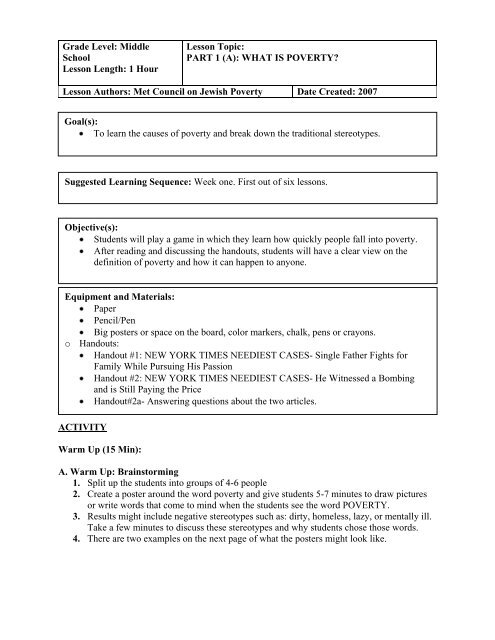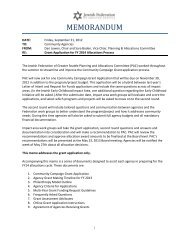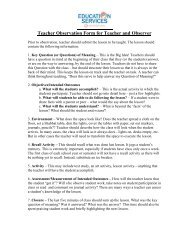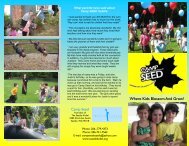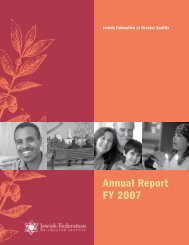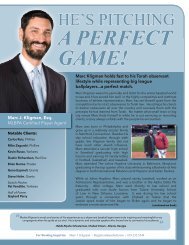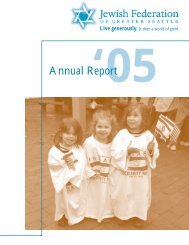Jewish Poverty Curriculum - Jewish Federation of Greater Seattle
Jewish Poverty Curriculum - Jewish Federation of Greater Seattle
Jewish Poverty Curriculum - Jewish Federation of Greater Seattle
- No tags were found...
You also want an ePaper? Increase the reach of your titles
YUMPU automatically turns print PDFs into web optimized ePapers that Google loves.
Grade Level: Middle<br />
School<br />
Lesson Length: 1 Hour<br />
Lesson Topic:<br />
PART 1 (A): WHAT IS POVERTY?<br />
Lesson Authors: Met Council on <strong>Jewish</strong> <strong>Poverty</strong> Date Created: 2007<br />
Goal(s):<br />
To learn the causes <strong>of</strong> poverty and break down the traditional stereotypes.<br />
Suggested Learning Sequence: Week one. First out <strong>of</strong> six lessons.<br />
Objective(s):<br />
Students will play a game in which they learn how quickly people fall into poverty.<br />
After reading and discussing the handouts, students will have a clear view on the<br />
definition <strong>of</strong> poverty and how it can happen to anyone.<br />
Equipment and Materials:<br />
Paper<br />
Pencil/Pen<br />
Big posters or space on the board, color markers, chalk, pens or crayons.<br />
o Handouts:<br />
Handout #1: NEW YORK TIMES NEEDIEST CASES- Single Father Fights for<br />
Family While Pursuing His Passion<br />
Handout #2: NEW YORK TIMES NEEDIEST CASES- He Witnessed a Bombing<br />
and is Still Paying the Price<br />
Handout#2a- Answering questions about the two articles.<br />
ACTIVITY<br />
Warm Up (15 Min):<br />
A. Warm Up: Brainstorming<br />
1. Split up the students into groups <strong>of</strong> 4-6 people<br />
2. Create a poster around the word poverty and give students 5-7 minutes to draw pictures<br />
or write words that come to mind when the students see the word POVERTY.<br />
3. Results might include negative stereotypes such as: dirty, homeless, lazy, or mentally ill.<br />
Take a few minutes to discuss these stereotypes and why students chose those words.<br />
4. There are two examples on the next page <strong>of</strong> what the posters might look like.
B. “How does poverty affect our lives?” activity: Step forward to demonstrate how many<br />
people are affected by poverty.<br />
1. Before beginning activity, say: The objective <strong>of</strong> the activity is to show that poverty<br />
affects all <strong>of</strong> us one way or another. However, some people might have more<br />
experience with poverty than others and their input is highly appreciated. Everyone<br />
is expected to behave in a mature and respectful manner during and after the<br />
activity. If anyone does not feel comfortable participating, they will not be<br />
penalized in any way.<br />
2. Have all the students line up in the back <strong>of</strong> the classroom.<br />
3. Explain to students the rules <strong>of</strong> the activity.<br />
4. Demonstrate one simple example such as: everyone who is wearing blue, take one<br />
step forward.<br />
5. Then ask questions below:<br />
Question 1: Take a step forward if you have a grandparent who lives with<br />
you or you know someone who has an older relative living in their<br />
household.<br />
Question 2: Take a step forward if you know someone who has been laid<br />
<strong>of</strong>f or fired from a job before.<br />
Question 3: Take a step forward if you know someone who is taking classes<br />
to either better their education or advance in the work place.<br />
Question 4: Take a step forward if you ever heard someone complaining<br />
about bills they had to pay.<br />
Question 5: Take a step forward if you think that most poor people are on<br />
Temporary Assistance for Needy Families, commonly known as welfare.<br />
Question 6: Take a step forward if you think poor people contribute to their<br />
situation.<br />
7. Reflection: Have a 5-10 minute reflection activity about how many people are affected<br />
by poverty. A number <strong>of</strong> students might end up in the front <strong>of</strong> the room, meaning their lives<br />
or the lives <strong>of</strong> people they know are affected by poverty. Sometimes people run into bad luck<br />
and end up in financial trouble. If they do not have the financial security or others helping<br />
them, they may find themselves in poverty. However, just because you have things in<br />
common with people in poverty, does not mean that you or your family will end up<br />
struggling financially.<br />
8. Wrap up activity: Letter to Yourself<br />
Have students take out a piece <strong>of</strong> paper and a writing utensil. Students should spend 5<br />
minutes writing a letter about what poverty means to them.<br />
i. How does it affect your life?<br />
ii. What does it make you think <strong>of</strong>?
iii. Why is it important to learn about poverty?<br />
Collect and save letters to be handed back during the last lesson <strong>of</strong> the curriculum.<br />
Activity (40 Min):<br />
9. Directions: Reading and Discussing Article 1, Handout #1:<br />
b. Divide students into groups <strong>of</strong> 3-4 and pass out Handout #1.<br />
c. Have one student in each group read aloud while others follow. Read over the<br />
articles: the ‘intro’, ‘problem’ and glossary.<br />
d. When each group has completed reading ‘intro’ and ‘problem’ discuss:<br />
i. Why do you think the father is in this predicament?<br />
ii. What are some ways the single father could get his life back on track?<br />
e. After ample discussion time, have all the students return facing the front <strong>of</strong> the<br />
room looking at the teacher.<br />
f. Class Discussion: Have students answer questions.<br />
i. Raise your hand if you think the father could have avoided the situation?<br />
ii. Based on this article how would you define poverty?<br />
iii. What were some <strong>of</strong> the father’s needs that he was unable to fulfill?<br />
iv. Do you think that someone should abandon his or her passions in order to<br />
pay bills?<br />
g. Read the ‘resolution’ out loud to the class.<br />
i. Ask students if they think if the help is sustainable.<br />
10. Directions: Reading and Discussing Article 2, Handout #2:<br />
a. Direct students back to the front <strong>of</strong> the room and have one student pass out<br />
Handout #2. Ask students to follow along with the reading since they may be<br />
called on.<br />
b. Teacher allows students to take turns reading the glossary and Handout #2 aloud<br />
to class.<br />
c. Class Discussion: How poverty affects people.<br />
i. How do you think people in poverty feel on a daily basis?<br />
ii. Can stress be a contributing factor to poverty? Why or why not?<br />
iii. Is there a way the Baxter family could find a way out <strong>of</strong> poverty?<br />
iv. What are some ways they could find help?<br />
v. Throughout the discussion, have the students generate a list on the board<br />
about possible solutions for Baxter to find a way out <strong>of</strong> poverty.<br />
Teacher Wrap Up (5 Min):<br />
11. Conclusion:<br />
a. Class Discussion: Why did we read these stories?<br />
i. Did the handouts change your opinion about those in poverty?<br />
ii. These were just a couple <strong>of</strong> examples about how families might find<br />
themselves in poverty. Can you think <strong>of</strong> other examples?<br />
Many times when we hear the word poverty, we think <strong>of</strong> those in third<br />
world countries with no food or shelter or medical help.<br />
We also think <strong>of</strong> those in poverty as people who are on the streets, or<br />
those who need homeless shelters or soup kitchens.<br />
Keep in mind that poverty accounts for a lot more people than just the<br />
stereotypes:<br />
o Now and then incidents such as a rent increase or having to pay<br />
for medication may push people into debt.
o Single parents, seniors who are no longer able to work, those<br />
who have unexpected emergencies or students and families that<br />
cannot pay <strong>of</strong>f loans or debt all contribute to the percentage <strong>of</strong><br />
those in poverty.<br />
Federal help and certain non-pr<strong>of</strong>its organizations are opportunities that<br />
are open for people who are in need <strong>of</strong> assistance.<br />
<strong>Poverty</strong> is not an unsolvable problem. And it is our responsibility to help<br />
alleviate it.<br />
b. Take any further questions students might have.
NEW YORK TIMES NEEDIEST CASES<br />
Single Father Fights for Family While Pursuing His Passion<br />
Michael is a hardworking single father <strong>of</strong> two. Since his recent divorce, he has shared custody <strong>of</strong><br />
his two young sons with his wife. His passion is art; his love <strong>of</strong> painting and graphic design has<br />
driven his career aspirations since an early age. He teaches Graphic Arts full-time at a<br />
University’s art school in New York City and works out <strong>of</strong> his apartment on other artistic<br />
pursuits. While he enjoys teaching, his ultimate goal is to support himself exclusively from his<br />
own work. Michael is extremely pro-active and motivated to support his family and follow his<br />
passions.<br />
Problem:<br />
Over the past two years, unexpected costs have overwhelmed Michael. His rent has been raised<br />
twice in the past year – from $805 to $1195 for his small apartment on the Lower East Side.<br />
Michael has worked independently to research whether this is a legal increase. In addition to<br />
these rent costs, the costs incurred* by his divorce have taken their toll. With the legal costs<br />
from the divorce and the unexpected costs for his apartment, Michael fell behind in paying his<br />
bills. One bill in particular was from a purchase <strong>of</strong> needed computer equipment for his freelance<br />
design projects that supplement* his income. This outstanding computer bill was forwarded to<br />
the collection agency that issued a legal process to Michael’s bank. The bank froze his account.<br />
While only $180 was in the account, it had been used for immediate expenses to feed his<br />
children and pay his bills. This left Michael unable to cover basic costs including childcare and<br />
his January 2005 rent. Michael found himself in a Catch-22*; his attempts to further his career<br />
and better his financial situation for his family could not be met because <strong>of</strong> the crisis situation he<br />
found himself in with his rising rent and costs associated with being a single parent.<br />
Resolution:<br />
Michael took a proactive* approach to getting help and making changes in his life. When<br />
coming to Met Council’s Crisis Intervention Department, he met with a social worker to review<br />
his situation and look ahead to his future. Together, they worked on identifying ways to earn<br />
extra income*. Through the Crisis Department*, Met Council provided Michael with $500 for<br />
rent, referrals to Budget & Credit Counseling Services (BUCCS),* and free tax assistance.<br />
Perhaps the most valuable source was the social worker’s referral* to the Career Services<br />
Department at Met Council. There, Michael met with a career counselor to identify potential<br />
patrons for his artwork and additional work opportunities to supplement his income. Since this<br />
meeting in January, Michael has continued to produce his work with great results. With help<br />
from Career Services*, Michael found a private patron through craigslist.com* who purchased<br />
two pieces from Michael. In May, he exhibited in his Lower East Side community in the LES<br />
Arts Show at Theater For the New City and currently has his portraits on display at The Meat<br />
Market at Jeffrey’s on Essex Street. Perhaps the most exciting component is Michael’s recent<br />
completion <strong>of</strong> a large project <strong>of</strong> portraits representing the Lower East Side. He is now looking to<br />
find a gallery willing to sponsor him and sell his pieces. Michael, with Met Council’s help, has<br />
found a way to both support his family and do what he loves.<br />
Handout #1
Glossary<br />
Incurred: To acquire or come into (something usually undesirable); sustain<br />
Supplement: Something added to complete a thing, make up for a deficiency, or<br />
strengthen the whole<br />
Catch-22: A no-win dilemma or paradox; i.e. you can’t get a job without<br />
experience, but you can’t gain experience without a job<br />
Proactive: Acting in advance to deal with an expected difficulty; taking a situation<br />
into your own hands to come up with a solution<br />
Income: The amount <strong>of</strong> money received during a period <strong>of</strong> time in exchange for<br />
labor or services<br />
Crisis Department: Metropolitan Council on <strong>Jewish</strong> <strong>Poverty</strong>’s department that helps<br />
people avoid eviction, obtain medical and pharmaceutical assistance, receive emergency<br />
donations <strong>of</strong> food, shelter and furniture, and prevent domestic violence and abuse<br />
Budget & Credit Counseling Services (BUCCS): A community service organization<br />
licensed by the New York State Banking Department. Their mission is to assist<br />
individuals and families that are experiencing financial difficulties and to educate<br />
consumers about their rights and responsibilities<br />
Referral: To direct to a source for help or information<br />
Career Services: Metropolitan Council <strong>of</strong> <strong>Jewish</strong> <strong>Poverty</strong>’s department that helps jobseekers<br />
through programs such as job development, vocational counseling, vocational skills<br />
training teams, thereby opening doors to job opportunities<br />
Craigslist.com: A website on which people can list or search for job opportunities (or many<br />
other goods and services) in a specific city<br />
Sustainable (see questions below): To be able to maintain; to supply with necessities<br />
Handout #1
Adapted from NEW YORK TIMES NEEDIEST CASES<br />
He Witnessed a Bombing and Is Still Paying the Price<br />
By STEPHANIE ROSENBLOOM<br />
The New York Times December 7, 2004<br />
“This is a song about freedom," says the man with the guitar as the band begins to<br />
play. It is after midnight on a beachfront strip by the Mediterranean Sea, and music wafts from Mike's<br />
Place, a popular blues bar in Tel Aviv.<br />
Inside, people are dancing on the tables. Hips twitch. Fists shake. Couples kiss. Waitresses wriggle<br />
through the crowd carrying foamy beers high above their heads.<br />
But then the music stops. There is only darkness, and silence so palpable, it is like a high-pitched scream.<br />
Suddenly, orange-vested men are running with stretchers. Glass is everywhere. People who were<br />
dancing moments before are on their knees in the streets; their skin is red in the glow <strong>of</strong> ambulance lights<br />
as they press their hands to their faces and cry.<br />
This is footage from "Blues by the Beach," a documentary produced by Jack Baxter and his wife, Fran<br />
Strauss-Baxter, New Yorkers whose comfortable lives were cast into chaos when a suicide bomber<br />
detonated his explosives at the entrance to Mike's Place on April 30, 2003.<br />
Mr. Baxter and his crew were there that night to film the lighter side <strong>of</strong> life in Israel. They ended up<br />
capturing the horror.<br />
Into the hospital the camera goes, into a white antiseptic room where Mr. Baxter, 52, lies with his neck in<br />
a brace, his arm in a cast, his skin scorched, his limbs lacerated, and his eardrums blown out.<br />
A brain contusion has left him partly paralyzed on his left side, and last winter he developed bumps on his<br />
body that doctors call organic shrapnel - pieces <strong>of</strong> the bomber's body embedded in his.<br />
Ms. Strauss-Baxter, 53, was in the couple's l<strong>of</strong>t on West 29th Street in Manhattan when she got the call<br />
about her husband. She flew to Ichilov Hospital in Tel Aviv, where three days later Mr. Baxter regained<br />
consciousness.<br />
The Baxters wanted to make a documentary about peace, about a place where Israelis and Arabs could sit<br />
at the same bar and listen to the blues; where religion and politics take a backseat to dancing.<br />
"That's what life should be," Ms. Strauss- Baxter said. "People living alongside each other."<br />
She and her husband know about religious harmony. Mr. Baxter is a filmmaker and a freelance journalist<br />
who grew up Catholic in the Bronx. Ms. Strauss-Baxter is a children's book designer from Great Neck,<br />
N.Y., and is <strong>Jewish</strong>. They met seven years ago at the ro<strong>of</strong>top pool at the Holiday Inn on West 57th Street.<br />
Though their love for each other remains strong, their ordeal has left them destitute* and exhausted. "We<br />
have absolutely no money," said Ms. Strauss-Baxter, who quit her job last year to care for her husband.<br />
Transportation to and from medical appointments and rehabilitation for Mr. Baxter depleted the couple's<br />
savings. Bills piled up, and Ms. Strauss-Baxter did not know where to turn.<br />
A childhood friend <strong>of</strong> Mr. Baxter’s suggests that the couple seek help from UJA-<strong>Federation</strong> <strong>of</strong> New<br />
York*, one <strong>of</strong> seven charities supported by The New York Times Neediest Cases Fund*.<br />
Handout #2
The <strong>Federation</strong> referred the Baxters to the Metropolitan Council on <strong>Jewish</strong> <strong>Poverty</strong>*, one <strong>of</strong> its<br />
beneficiaries, where $1,083 from the Neediest Cases was used to pay the couple's rent and Consolidated<br />
Edison bills for two months while they got back on their feet.<br />
"You have no idea how much this meant; it helped me not only financially, but to be able to talk," Ms.<br />
Strauss-Baxter said, referring to the supportive staff at the Metropolitan Council.<br />
Ms. Strauss-Baxter recently began working again, designing children's textbooks.<br />
Mike's Place is recovering, too. It reopened only seven days after the bombing, on Israel's Memorial Day.<br />
"Evil walked into Mike's Place, trying to ruin us, trying to erase us," Gal Ganzman, the owner <strong>of</strong> Mike's<br />
Place, says in the documentary. "But you can't beat us, because love can't be beat. We got stronger. We<br />
got closer."<br />
The same can be said <strong>of</strong> the Baxters. Their labor <strong>of</strong> love, "Blues by the Beach," had its premiere in<br />
October at the Hamptons International Film Festival on Long Island, where it received the Dan and Ewa<br />
Abraham and Tammy Abraham Films <strong>of</strong> Conflict and Resolution Award.<br />
Two British Muslims killed 3 people and wounded more than 50 in the bombing that changed the Baxters'<br />
lives. Asif Hanif detonated his explosives; those strapped to his accomplice, Omar Khan Sharif, failed to<br />
detonate. Yet there is one thing that both men failed to do: deter the Baxters from returning to Israel.<br />
When they are financially able, they plan to go back to Tel Aviv, and to Mike's Place, where every night<br />
the sound <strong>of</strong> the blues still wafts along the Mediterranean.<br />
Glossary<br />
Destitute: Lacking resources or the means <strong>of</strong> subsistence; completely impoverished<br />
UJA-<strong>Federation</strong> <strong>of</strong> New York: Caring for those in need, rescuing those in harm's<br />
way, and renewing and strengthening the <strong>Jewish</strong> people in New York, in Israel, and<br />
around the world<br />
New York Times Neediest Cases Fund: Raises millions <strong>of</strong> dollars to help thousands<br />
<strong>of</strong> individuals and families in distress<br />
Metropolitan Council On <strong>Jewish</strong> <strong>Poverty</strong>: A not-for-pr<strong>of</strong>it organization representing<br />
and coordinating the efforts <strong>of</strong> grass roots <strong>Jewish</strong> Community Councils and citywide and<br />
national <strong>Jewish</strong> organizations. It is the primary advocate for the needs <strong>of</strong> poor Jews,<br />
reaching out to the isolated <strong>Jewish</strong> poor and elderly, and increasing public recognition <strong>of</strong><br />
the extent and nature <strong>of</strong> poverty among Jews through legislative and social advocacy<br />
For more information about the bombing in Tel Aviv at Mike’s place which changed the Baxter’s<br />
lives, check out the following sites:<br />
http://en.wikipedia.org/wiki/Mike's_Place (Encyclopedia account <strong>of</strong> the event)<br />
Handout #2
Discussion questions for articles 1 and 2.<br />
Article#1<br />
1) Do you think the father could have avoided the situation? How?<br />
2) Based on this article how would you define poverty?<br />
3) What were some <strong>of</strong> the father’s needs that he was unable to fulfill?<br />
4) Do you think that someone should abandon his or her passions in order to pay bills?<br />
Article#2<br />
1) How do you think people in poverty feel on a daily basis?<br />
2) Can stress be a contributing factor to poverty? Why or why not?<br />
3) Is there a way the Baxter family could find a way out <strong>of</strong> poverty?<br />
4) What are some ways they could find help?<br />
Handout#2a


